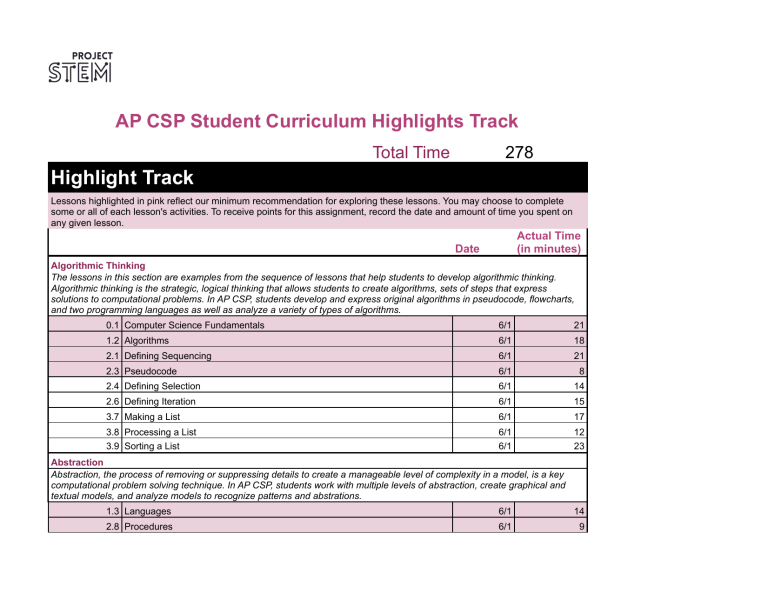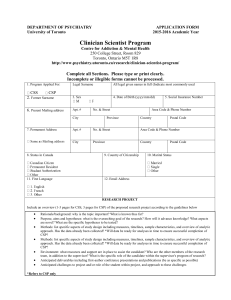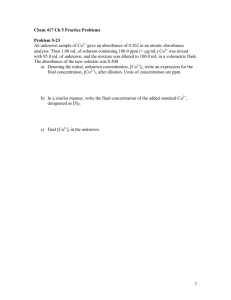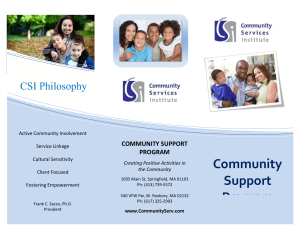
AP CSP Student Curriculum Highlights Track Total Time 278 Highlight Track Lessons highlighted in pink reflect our minimum recommendation for exploring these lessons. You may choose to complete some or all of each lesson's activities. To receive points for this assignment, record the date and amount of time you spent on any given lesson. Actual Time (in minutes) Date Algorithmic Thinking The lessons in this section are examples from the sequence of lessons that help students to develop algorithmic thinking. Algorithmic thinking is the strategic, logical thinking that allows students to create algorithms, sets of steps that express solutions to computational problems. In AP CSP, students develop and express original algorithms in pseudocode, flowcharts, and two programming languages as well as analyze a variety of types of algorithms. 0.1 Computer Science Fundamentals 6/1 21 1.2 Algorithms 6/1 18 2.1 Defining Sequencing 6/1 21 2.3 Pseudocode 6/1 8 2.4 Defining Selection 6/1 14 2.6 Defining Iteration 6/1 15 3.7 Making a List 6/1 17 3.8 Processing a List 3.9 Sorting a List 6/1 6/1 12 23 Abstraction Abstraction, the process of removing or suppressing details to create a manageable level of complexity in a model, is a key computational problem solving technique. In AP CSP, students work with multiple levels of abstraction, create graphical and textual models, and analyze models to recognize patterns and abstrations. 1.3 Languages 6/1 14 2.8 Procedures 6/1 9 AP CSP Student Curriculum Highlights Track Total Time 278 Highlight Track Lessons highlighted in pink reflect our minimum recommendation for exploring these lessons. You may choose to complete some or all of each lesson's activities. To receive points for this assignment, record the date and amount of time you spent on any given lesson. Actual Time (in minutes) Date 2.10 Logic Gates and Hardware 3.3 Lesson Exercise B 4.9 Encoding Schemes 5.8 Models and Simulations 6.6 Internet Protocols 6.9 World Wide Web Discrete Mathematics Discrete mathematics is concerned with finite systems and includes topics such as number bases, conversions, modular arithmetic, Boolean algebra and logic, geometry, and recursion. While students do not need to be a math genius to be successful in the AP CSP course, students will use a variety of basic concepts from discrete mathematics to support their work. 3.1 Binary 6/1 30 3.2 Base Conversions 6/1 16 3.3 ASCII to Unicode 4.6 Procedural Abstraction 4.7 RGB Color Data and Information Lessons that focus on this big idea help students understand how computers are used to analyze, store, calculate, and transform data. 1.4 Idea to Execution 6/1 10 AP CSP Student Curriculum Highlights Track Total Time 278 Highlight Track Lessons highlighted in pink reflect our minimum recommendation for exploring these lessons. You may choose to complete some or all of each lesson's activities. To receive points for this assignment, record the date and amount of time you spent on any given lesson. Actual Time (in minutes) Date 5.1 Introduction to Big Data 6/2 23 5.2 Usability and Usefulness of Data 5.3 Collection 5.4 Extraction 5.5 Data Storage and Persistence 5.6 Statistical Analysis 5.7 Data Mining The Internet The Internet and the systems built on it are critical to modern computing, supporting unprecedented communication and collaboration. Understanding the principles behind these systems is necessary for developing computational solutions that harness them. In AP CSP, students begin to understand how the Internet and the systems built on it operate as well as consider related concerns like cybersecurity. 6.2 Impact of Internet Access 6.3 Cloud Computing 6/2 4 6/2 9 6/2 8 6.4 Internet in Action 6.5 Communication Protocols 6.6 Internet Protocols 6.7 Encryption 6.8 Cybersecurity AP CSP Student Curriculum Highlights Track Total Time 278 Highlight Track Lessons highlighted in pink reflect our minimum recommendation for exploring these lessons. You may choose to complete some or all of each lesson's activities. To receive points for this assignment, record the date and amount of time you spent on any given lesson. Actual Time (in minutes) Date 6.9 World Wide Web 6.11 Internet of Things Global Impact Computing innovations impact the way people work, play, and live - both positively and negatively. In AP CSP, students will identify computing innovations that have a computer or program code as an integral component as well as analyze such innovations to uncover potential benefits and harmful effects on people and society. Unit 2 Big Picture: Moore's Law 6/2 6 Unit 3 Big Picture: Reselling Digital Music Unit 4 Big Picture: Ethics of Digital Manipulation Unit 4 Big Picture: Intellectual Property Unit 5 Big Picture: Wisdom of the Crowd Unit 5 Big Picture: Data Breaches 6.1 Global Impact Unit 6 Big Picture: Digital Divide Unit 6 Big Picture: Net Neutrality 6.10 Distributed Computing 6.12 Ethics of Autonomous Technology Total Time: 278


